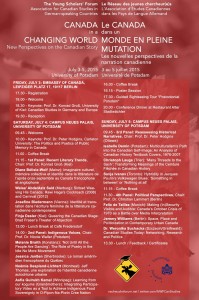Conference and Call for Papers:
Third Bremen Conference on Language and Literature in Colonial and Postcolonial Contexts:
„Postcolonial Knowledges“
University of Bremen, March 15-18, 2016
Organizers: Prof. Dr. Kerstin Knopf, Prof. Dr. Eeva Sippola
This interdisciplinary conference brings together scholars of different academic backgrounds to explore how knowledge systems, cultures, languages, and literary traditions have been affected by colonial and postcolonial conditions that are increasingly marked by contradictions, cultural heterogeneity, and transcultural processes. We are interested in the ways in which colonial and postcolonial constellations have been reflected, shaped, and negotiated by communication, symbolic practice, and knowledge practices.
We will look critically at ongoing knowledge production and Eurocentric ‘intellectual dominance’ (Emeagwali 2003) in knowledge centers and discourses around the world. We aim to crystallize decolonial strategies to challenge neocolonial tendencies in institutions of knowledge production and to probe the possibilities of integrating postcolonial knowledges into present knowledge discourses. Many collaborations and attempts to interlink Eurocentric and non-Eurocentric knowledge systems are already taking place, and scholars around the globe are producing alternative postcolonial visions of reality and the world that are embedded in non-European lives, ontologies, and philosophies (e.g. Armstrong 2009; Atleo 2009, 2011; Dogbe 2006; Garcés V 2012; Moctar Ba 2013).
To address these issues, this conference focuses on themes related to the marginalization and displacement of local knowledge systems and the endangerment of languages as well as on epistemological and language ideologies in colonial and postcolonial settings.
We welcome contributions from linguistics, cultural studies, literature and film studies, anthropology, history, political science, sociology, and other disciplines.
Further information on the Conference and the Call for Papers can be found here.

